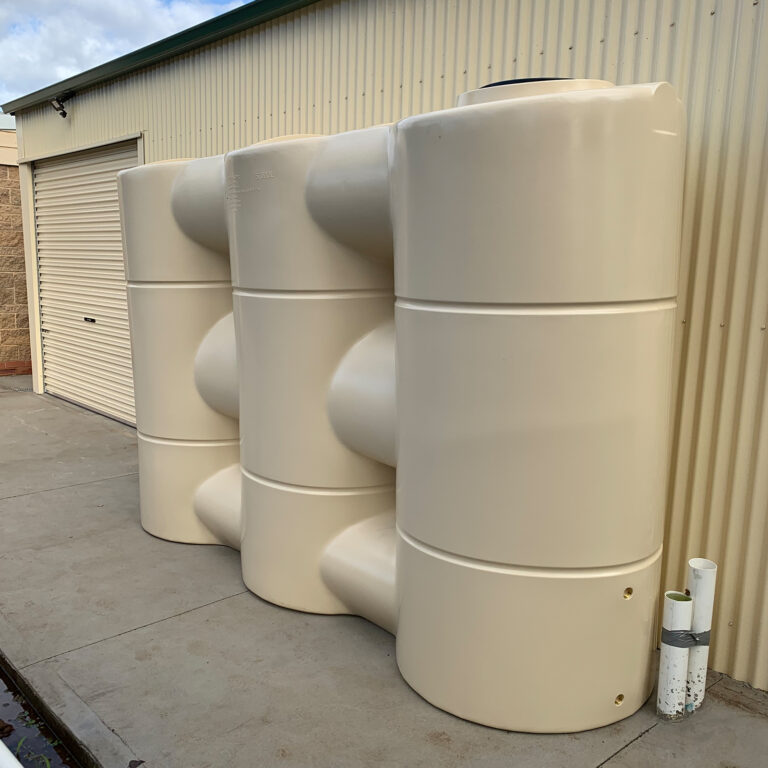Exploring the Numerous Uses Rain Storage Tanks for Residential and Commercial Qualities
As the worldwide focus on lasting living practices proceeds to escalate, the usage of rainwater storage tanks in both residential and industrial settings has actually emerged as an essential remedy. The complex usages of rain tanks offer a compelling case for their adoption, not only as a practical water-saving measure however also as a testimony to accountable resource management.
Benefits of Making Use Of Rainwater Storage Tanks
Utilizing rain storage tanks uses many benefits for both houses and areas in terms of water conservation and sustainability. Among the key advantages of making use of rainwater tanks is the substantial reduction in reliance on mains water - Slimline water tanks. By capturing and keeping rain for later usage, individuals and communities can reduce their need for cured water, eventually alleviating the burden on water therapy centers and reducing energy intake associated with water transport and treatment
In addition, rainwater collecting via storage tanks provides a trustworthy alternative water source during times of water limitations or lacks. This stored rain can be utilized for various non-potable functions such as irrigation, flushing commodes, and washing clothing, reducing the strain on traditional water sources. In addition, utilizing rainwater tanks can lead to cost savings for both homes and areas by lowering water costs and reducing the demand for costly framework expansions to satisfy expanding water demands.
In significance, the use of rainwater containers provides a lasting and eco-friendly strategy to water management, benefiting both specific customers and the wider neighborhood in regards to water preservation, cost-efficiency, and strength.
Rain Container Usage in Irrigation
Offered the advantages of rain storage tanks in preserving water sources and lowering dependence on mains water, a substantial application hinges on utilizing saved rainwater for watering purposes - Slimline water tanks. Rain harvesting systems can effectively gather and keep rain, providing a lasting water resource for sprinkling yards, grass, and agricultural fields. By utilizing rain for irrigation, homeowner can minimize their dependence on cured water sources, resulting in cost financial savings and ecological benefits

One of the primary advantages of utilizing rain for watering is its purity. Rain is naturally soft and devoid of the chemicals and additives frequently located in keys water, making it optimal for beneficial plants without the threat of harmful results. Additionally, rainwater is at ambient temperature level, which can profit plant growth by staying clear of temperature shocks that can happen with cold mains water.
Rainwater Storage Tanks for Commode Flushing

Executing rainwater tanks for commode flushing is a cost-efficient and environmentally friendly practice that can be easily integrated right into both domestic and business residential properties. The stored rainwater can be used to purge bathrooms by attaching the container to the existing plumbing system. This straightforward yet effective Continued service can substantially reduce water consumption in a structure, particularly in areas where water scarcity is an issue.

Integrating Rainwater Containers in Landscaping
An effective strategy for boosting sustainability in landscape design entails incorporating rainwater storage tanks to optimize water use and promote environment-friendly techniques - Slimline water tanks. Integrating rain containers in landscaping supplies many benefits for both domestic and commercial residential properties. These containers can record and save rain runoff from roofings, which can then be made use of for sprinkling yards, yards, and plants. By making use of rain for watering functions, homeowner can minimize their reliance on local water sources, leading to cost savings and conservation of priceless water sources.
In addition to providing a lasting water source for landscaping requirements, rain tanks can likewise assist in taking care of stormwater runoff. By recording rainwater that would or else move into tornado drains pipes, these storage tanks go to this site can minimize disintegration, reduce flooding threats, and avoid contamination of all-natural water bodies. Integrating rainwater tanks in landscape design can add to the general aesthetic appeal of the residential property, showcasing a dedication to ecological stewardship.
Industrial Applications of Rainwater Tanks
Making use of rainwater tanks in commercial setups supplies a lasting solution for water management and preservation, profiting services and the environment alike. Industrial applications of rainwater storage tanks vary and increasingly preferred due to the cost financial savings and environmental advantages they give. One essential business use is for irrigation purposes, where harvested rain can be used to water landscaping, yards, and agricultural areas bordering industrial buildings. This can bring about substantial decreases in water expenses and reliance on metropolitan water resources.
Additionally, rainwater tanks can be integrated into the fire suppression systems of industrial structures. By having a specialized water resource for firefighting purposes, businesses can enhance their fire safety steps and potentially reduce insurance costs. In addition, rainwater gathered in storage tanks can be dealt with and made use of for non-potable purposes within industrial properties, such as flushing toilets, cleaning, and cooling down systems. This not only conserves fresh water resources but additionally lowers operating expense for companies. In general, the consolidation of rainwater containers in commercial setups presents a functional and ecologically accountable strategy to water administration.
Final Thought
From irrigation to bathroom flushing and landscaping, the usage of rain tanks can aid preserve water sources and reduce water expenses. Overall, the convenience and sustainability of rain containers make them a useful financial investment for any type of residential or commercial property owner looking to boost water efficiency.
Comments on “Slimline Water Tanks: The Perfect Selection for Urban Water Storage”